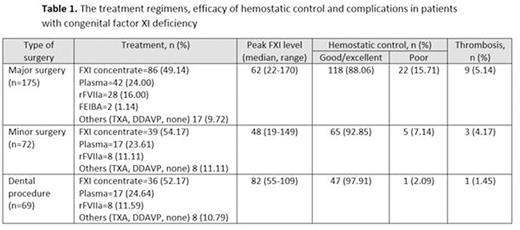Abstract
Background: Congenital Factor XI (FXI) deficiency is the most common rare bleeding disorder, characterized by production defect of FXI. Bleeding manifestation is usually mild and associated with trauma or surgery. The treatment options during surgery include plasma, FXI concentrate, recombinant activated factor VII (rFVIIa), etc. This study aimed to investigate the efficacy of hemostatic control and thrombotic complications in patients with congenital FXI deficiency who underwent surgery or an invasive procedure.
Methods: We conducted a systematic search in MEDLINE, EMBASE and CENTRAL database from inception to March 2016. We included the case reports and case series of patients with congenital FXI deficiency. Studies must report the perioperative treatment regimen, hemostatic outcome and thromboembolic complication. The pre- and post-FXI levels were collected. The primary outcome was the efficacy of hemostatic control and the safety outcome was thromboembolic complication.
Results: There were 87 studies included in this review, involving 310 patients with congenital FXI deficiency. Median age was 49.5 years (range 0.3 to 94). Forty percent of the patients were male. Median baseline FXI level was 6.0% (range <1 to 75.0). FXI concentrate was the most common treatment (48.39%), following by plasma (21.61%), rFVIIa (12.90%) and others (FEIBA, DDAVP, tranexamic acid and no treatment; 17.1%). Hemostatic control was found to be good or excellent in 118 patients (88.06%) who had major surgery, 65 patients (92.85%) in minor surgery and 47 patients (97.91%) in dental procedure, Table 1. Thromboembolic events were reported in 7/150 (4.67%) patients treated with FXI concentrate and 4/34 (11.76%) patients treated with rFVIIa, Table 2. None of patients receiving plasma, FEIBA, DDAVP or tranexamic acid had thrombosis.
Conclusion: Hemostatic control during perioperative periodwas achieved in majority of patients with congenital FXI. Peak plasma FXI should be obtained in patients treated with plasma or FXI concentrate with the target FXI of 60-70% for major surgery and 40-50% for minor surgery. With respect to the higher risk of thromboembolic complication, we recommend plasma over FXI concentrate and rFVIIa for perioperative treatment in patients with FXI deficiency.
No relevant conflicts of interest to declare.
Author notes
Asterisk with author names denotes non-ASH members.



This feature is available to Subscribers Only
Sign In or Create an Account Close Modal